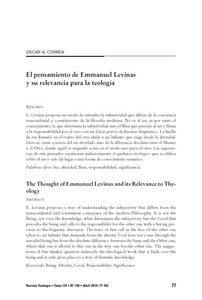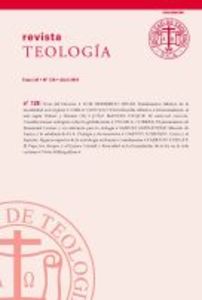Por favor, use este identificador para citar o enlazar este ítem:
https://repositorio.uca.edu.ar/handle/123456789/9397| Campo DC | Valor | Lengua/Idioma |
|---|---|---|
| dc.contributor.author | Correa, Oscar A. | es |
| dc.date.accessioned | 2020-02-14T11:53:27Z | - |
| dc.date.available | 2020-02-14T11:53:27Z | - |
| dc.date.issued | 2019 | - |
| dc.identifier.citation | Correa, O. A. El pensamiento de Emmanuel Levinas y su relevancia para la teología [en línea]. Teología. 2019, 56 (128). ISSN: 0328-1396. Disponible en: https://repositorio.uca.edu.ar/handle/123456789/9397 | es |
| dc.identifier.issn | 0328-1396 | - |
| dc.identifier.uri | https://repositorio.uca.edu.ar/handle/123456789/9397 | - |
| dc.description.abstract | Resumen: E. Levinas propone un modo de entender la subjetividad que difiere de la conciencia trascendental y constituyente de la filosofía moderna. No es el ser, ni por tanto el conocimiento, lo que determina la subjetividad sino el Bien que precede al ser y llama a la responsabilidad por el otro con un Decir previo al discurso lingüístico. La huella de ese llamado en el rostro del otro alude a un Infinito que exige desde la alteridad. Dios no viene a través del ser develado sino de la diferencia absoluta entre el Mismo y el Otro, donde aquél es asignado a éste en el modo uno-para-el-otro. Las sugerencias de este pensador cuestionan indirectamente el quehacer teológico que se edifica sobre el ser y solo da lugar a una forma de conocimiento temático. | es |
| dc.description.abstract | Abstract: E. Levinas proposes a way of understanding the subjectivity that differs from the transcendental and constituent conscience of the modern Philosophy. It is not the Being, not even the knowledge, what determines the subjectivity but the Good that precedes the being and calls to the responsibility for the other one with a Saying pre- vious to the linguistic discourse. The trace of that call in the face of the other one refers to an Infinite that demands from the alterity. God does not come through the unveiled being but from the absolute difference between the Same and the Other one, where that one is alloted to this one in the way one-for-the-other one. The sugges- tions of this thinker question indirectly the theological work that is built over the being and it only gives place to a way of thematic knowledge. | es |
| dc.format | application/pdf | es |
| dc.language.iso | spa | es |
| dc.publisher | Universidad Católica Argentina. Facultad de Teología | es |
| dc.rights | Acceso abierto | * |
| dc.rights.uri | http://creativecommons.org/licenses/by-nc-sa/4.0/ | * |
| dc.source | Teología. Tomo 56, No.128, 2019 | es |
| dc.subject | SER | es |
| dc.subject | ALTERIDAD | es |
| dc.subject | BIEN | es |
| dc.subject | RESPONSABILIDAD | es |
| dc.subject | Levinas, Emmanuel, 1906-1995 | es |
| dc.subject | FILOSOFIA | es |
| dc.subject | TEOLOGIA | es |
| dc.title | El pensamiento de Emmanuel Levinas y su relevancia para la teología | es |
| dc.title | The thought of Emmanuel Levinas and its relevance to theology | es |
| dc.type | Artículo | es |
| uca.disciplina | TEOLOGIA | es |
| uca.issnrd | 1 | es |
| uca.affiliation | Fil: Correa, Oscar A. Pontificia Universidad Católica Argentina. Facultad de Teología; Argentina | es |
| uca.version | publishedVersion | es |
| item.fulltext | With Fulltext | - |
| item.languageiso639-1 | es | - |
| item.grantfulltext | open | - |
| Aparece en las colecciones: | TEO - 2019 Tomo LVI nro. 128 | |
Ficheros en este ítem:
| Fichero | Descripción | Tamaño | Formato | |
|---|---|---|---|---|
| pensamiento-levinas-relevancia-teologia.pdf | 331,21 kB | Adobe PDF |  Visualizar/Abrir | |
| teologia128.jpg | 4,59 kB | JPEG |  Visualizar/Abrir |
Visualizaciones de página(s)
1.208
comprobado en 30-ene-2026
Descarga(s)
2.593
comprobado en 30-ene-2026
Google ScholarTM
Ver en Google Scholar
Este ítem está sujeto a una Licencia Creative Commons

